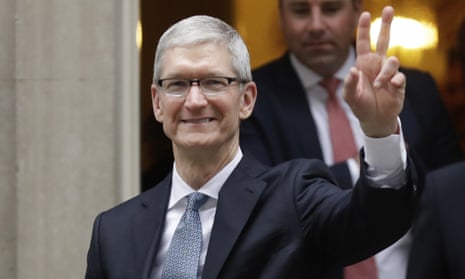Apple, LinkedIn, Spotify and Twitter have joined a growing chorus of technology companies to hit out at the far right and Donald Trump’s attempt to put white supremacists and leftwing counter-demonstrators at Saturday’s Charlottesville protest on the same moral plane.
Following the lead of Facebook’s Mark Zuckerberg, Google, Go Daddy and others, Apple CEO Tim Cook pledged $1m donations to the Southern Poverty Law Center (SPLC) and the Anti-Defamation League and sent a strongly worded memo to staff, quoting Martin Luther King, about the violence in Charlottesville on Saturday.
“We must not witness or permit such hate and bigotry in our country, and we must be unequivocal about it,” Cook wrote. “This is not about the left or the right, conservative or liberal. It is about human decency and morality.
“I disagree with the president and others who believe that there is a moral equivalence between white supremacists and Nazis, and those who oppose them by standing up for human rights. Equating the two runs counter to our ideals as Americans.”
Apple also pledged to match two-for-one employee donations to human rights groups until 30 September, and said it would roll out donation systems for the SPLC through its iTunes store.
Trump has faced a growing backlash over his defence of those who took part at the far-right rally in Charlottesville, Virginia. On Wednesday the US president was forced to disband two White House business councils that were disintegrating around him in the wake of his remarks. The same day, former US presidents George HW Bush and George W Bush issued a joint statement condemning racial bigotry.
Amid the ongoing fallout from the violence that saw a civil rights activist killed, music subscription service Spotify began removing so-called white power music, flagged by the SPLC as racist “hate bands”.
A Spotify spokesperson said: “Illegal content or material that favours hatred or incites violence against race, religion, sexuality or the like is not tolerated by us. Spotify takes immediate action to remove any such material as soon as it has been brought to our attention.
“We are glad to have been alerted to this content – and have already removed many of the bands identified, while urgently reviewing the remainder.”
Social media revolt
Twitter has removed accounts affiliated with neo-Nazi site the Daily Stormer, which lost its domain registration earlier this week.
The company said in a statement that its policies prohibit violent threats, harassment and hateful conduct and that Twitter “will take action on accounts violating those policies”. The Daily Stormer accounts were being used to keep followers appraised of its various website moves, as it struggled to stay online, eventually retreating to the dark web to avoid action from tech companies and the Anonymous hacker collective.
Microsoft’s LinkedIn also suspended a page devoted to Daily Stormer and another page belonging to a man associated with the site, Andrew Auernheimer, but declined to comment.
Google’s YouTube also started terminating accounts linked to white supremacists, including that of Christopher Cantwell, a web commentator who has described himself as a white nationalist and said on his site that he had attended the Charlottesville rally. Facebook had also removed Cantwell’s accounts as part of its crackdown on neo-Nazism and hate speech.
The wave of crackdowns against white supremacists and neo-Nazis reflects a rapidly changing mindset among Silicon Valley firms on how far they are willing to go to police hate speech.
Technology companies have taken down violent propaganda from Islamic State and other militant groups, in part in response to government pressure. But most internet companies have traditionally tried to steer clear of making judgments about content except in cases of illegal activity.
